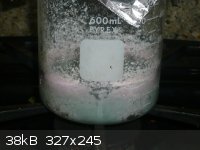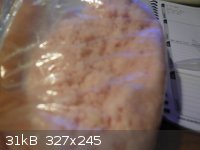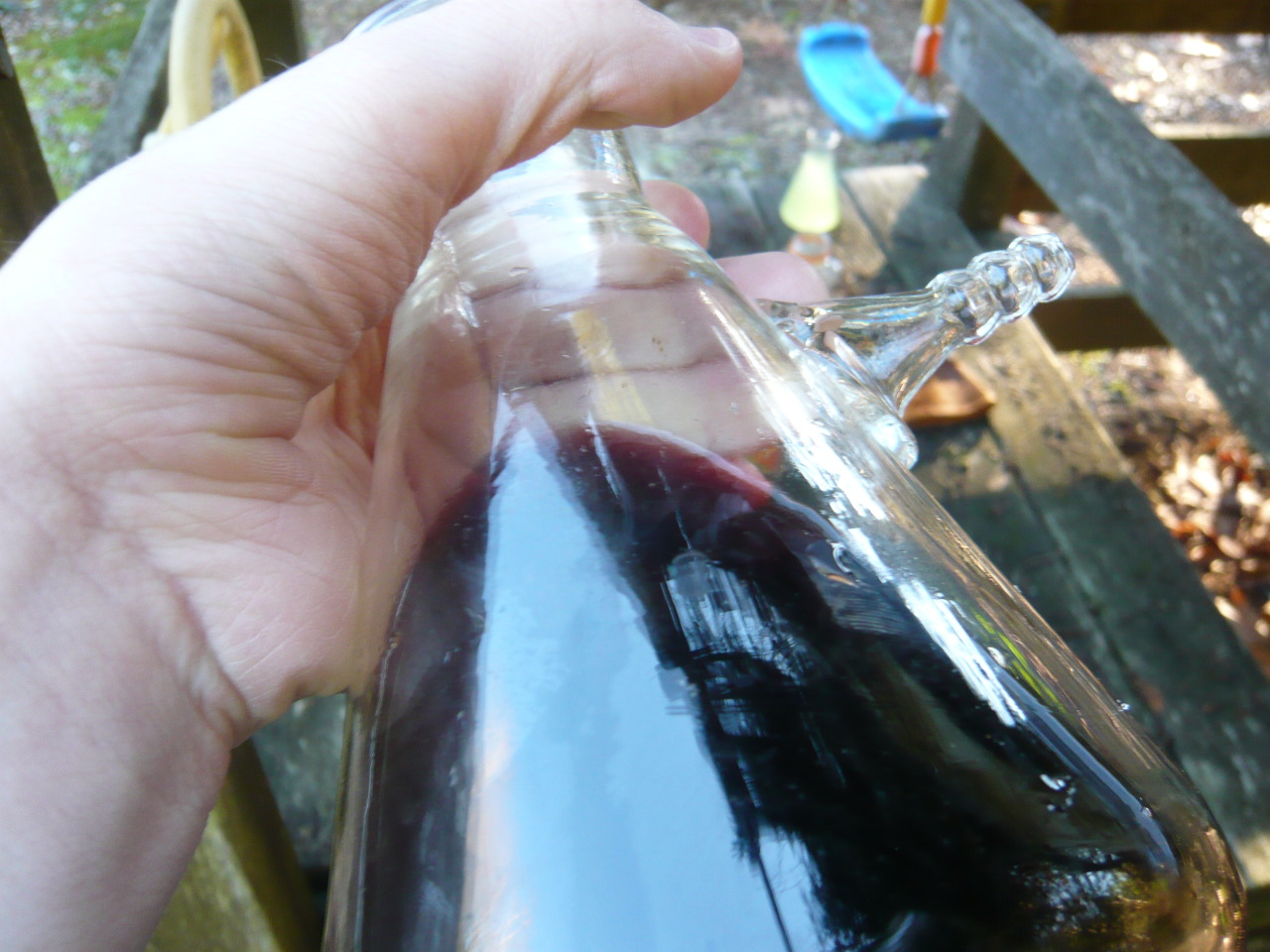| Pages:
1
..
3
4
5
6
7 |
elementcollector1
International Hazard
    
Posts: 2684
Registered: 28-12-2011
Location: The Known Universe
Member Is Offline
Mood: Molten
|
|
Reporting in; after using copious amounts of MnCO3 on a small amount of mother liquor, I have obtained a pink solution and excess carbonate (though
the solution still smells like it's reacting). This is a more colored pink than the stuff I had last time, so I'm assuming either this is a very
saturated solution or that there are still impurities in solution. Although that wouldn't explain such an excess of carbonate...
EDIT: Argh, how do I get this excess carbonate out? I threw four filters at it, and they're barely holding back half of the tan goop.
[Edited on 25-5-2012 by elementcollector1]
Elements Collected:52/87
Latest Acquired: Cl
Next in Line: Nd
|
|
|
Arthur Dent
National Hazard
   
Posts: 553
Registered: 22-10-2010
Member Is Offline
Mood: entropic
|
|
Yeah I know, coffee paper filters aren't the best in that situation. Ideally, I would suggest a Buchner funnel, but if you don't have one, perhaps
some real lab paper filters would be more efficient, like some fine porosity Whatman paper filters, but they take an eternity if you use gravity
filtration. Your best bet would be a Buchner funnel with vacuum.
However, using a Buchner funnel for heavy metals filtering means it should no longer be used for anything else but that. So if you use a Buchner
funnel for food grade stuff like vegetal extracts or brewing/distilling, use it exclusively for that.
Robert
--- Art is making something out of nothing and selling it. - Frank Zappa ---
|
|
|
blogfast25
International Hazard
    
Posts: 10562
Registered: 3-2-2008
Location: Neverland
Member Is Offline
Mood: No Mood
|
|
Quote: Originally posted by elementcollector1  |
EDIT: Argh, how do I get this excess carbonate out? I threw four filters at it, and they're barely holding back half of the tan goop.
[Edited on 25-5-2012 by elementcollector1] |
Don't 'throw filters at it'. Even with coffee filters your filtrate should eventually run clear if you just keep pouring it over the SAME filter over
and over, until must pores are more or less clogged.
Alternatively, simmer the slurry gently for a bit: it will increase the grain size of the carbonate particles.
If all else fails, allow to stand for a couple of days until liquor is perfectly clear, then carefully decant it off.
|
|
|
elementcollector1
International Hazard
    
Posts: 2684
Registered: 28-12-2011
Location: The Known Universe
Member Is Offline
Mood: Molten
|
|
Now it's much more pink, but still pretty colored (will filter a few more times).
This is working, though: I have a small test run of pure pink MnCl2 sitting next to me. It's nearly colorless, so no iron should be present (at least
not in dangerous amounts).
Excellent!
Elements Collected:52/87
Latest Acquired: Cl
Next in Line: Nd
|
|
|
elementcollector1
International Hazard
    
Posts: 2684
Registered: 28-12-2011
Location: The Known Universe
Member Is Offline
Mood: Molten
|
|
Boiled it down and got a green solution. I'm assuming this is Fe 2+, so how did that escape the original neutralization with MnCO3?
Elements Collected:52/87
Latest Acquired: Cl
Next in Line: Nd
|
|
|
blogfast25
International Hazard
    
Posts: 10562
Registered: 3-2-2008
Location: Neverland
Member Is Offline
Mood: No Mood
|
|
Add some peroxide to a small sample. Does it fizz and go brown/red?
|
|
|
elementcollector1
International Hazard
    
Posts: 2684
Registered: 28-12-2011
Location: The Known Universe
Member Is Offline
Mood: Molten
|
|
Not yet, but upon filtering through that carbonate-clogged filter it goes right back to pink (though I'm skeptical of that color now). I added
peroxide to the unconcentrated, pink stuff with no effect; we'll see about the green variety.
Elements Collected:52/87
Latest Acquired: Cl
Next in Line: Nd
|
|
|
blogfast25
International Hazard
    
Posts: 10562
Registered: 3-2-2008
Location: Neverland
Member Is Offline
Mood: No Mood
|
|
Quote: Originally posted by elementcollector1  | | Not yet, but upon filtering through that carbonate-clogged filter it goes right back to pink (though I'm skeptical of that color now). I added
peroxide to the unconcentrated, pink stuff with no effect; we'll see about the green variety. |
Photos would be great.
|
|
|
elementcollector1
International Hazard
    
Posts: 2684
Registered: 28-12-2011
Location: The Known Universe
Member Is Offline
Mood: Molten
|
|
Yes! Finally uploaded. Anyway, the first picture is that of the apparent green 'impurity', seconds before boiling down to the nice clean pic of the
powdered salt of the second.
 
Elements Collected:52/87
Latest Acquired: Cl
Next in Line: Nd
|
|
|
blogfast25
International Hazard
    
Posts: 10562
Registered: 3-2-2008
Location: Neverland
Member Is Offline
Mood: No Mood
|
|
Very nice end-product, EC1. A bit of a mystery that green...
|
|
|
elementcollector1
International Hazard
    
Posts: 2684
Registered: 28-12-2011
Location: The Known Universe
Member Is Offline
Mood: Molten
|
|
I'm having trouble with my manganese stock again!
Oddly enough, my original solution looks pink in a translucent container, but yellow in a clear one.
I tried the NaOH method, and I'm waiting for results, but it seems that there's no iron contamination (precipitate had no red in it).
I started from old MnCO3 that I had leftover from some of my original purifications, which dissolved extraordinarily slowly (unusual, considering it
was an acid-base reaction).
Is there hope for this solution?
Elements Collected:52/87
Latest Acquired: Cl
Next in Line: Nd
|
|
|
IrC
International Hazard
    
Posts: 2710
Registered: 7-3-2005
Location: Eureka
Member Is Offline
Mood: Discovering
|
|
Quote: Originally posted by 12AX7  | It oughta! I was dissolving zinc the other day and had to dump it into a larger jar, too much foam...
Further observations: shit, I think the above solution is turning to gel. 
Tim |
I know this post was long ago but new to me. I have read stories of arsine causing harm from impure Zinc in acid. How much worry should we place on
this possibility considering unknown purity Zn dust, i.e., typical fleabay purchase with buyer beware on quality?
"Science is the belief in the ignorance of the experts" Richard Feynman
|
|
|
12AX7
Post Harlot
    
Posts: 4803
Registered: 8-3-2005
Location: oscillating
Member Is Offline
Mood: informative
|
|
Hmm, I wouldn't think it much of a problem, zinc is most often distilled, achieving purity comparable to electrolytic metals (for instance, copper,
lead, silver, etc.). That said, arsenic is a volatile element itself. I haven't heard anything about it though. You'd certainly know by the smell!
Last time I was dissolving zinc, it didn't really smell like anything, which is an excellent sign there is very little of any calchophile in it:
sulfur, phosphorus, selenium, antimony, arsenic.
Tim
|
|
|
IrC
International Hazard
    
Posts: 2710
Registered: 7-3-2005
Location: Eureka
Member Is Offline
Mood: Discovering
|
|
Good to know. I like to collect those turn of the century recipe books (on processes, etc.) and read a couple stories of deaths caused by dissolving
ZN in acid. The coroner did tests looking for a deposition of a mirror surface and was positive in a few cases. I have been dissolving Zn for various
reasons for decades and never had problems nor noticed any garlic like odor. Yet reading some of these old stories got me to thinking I should be less
cavalier experimenting once in a while. I had assumed modern processes produced less of these problems. I do know it was a real danger back then
depending upon where the starting materials were mined. At least that was the conclusion in one of the stories, that one about a doctor in England
doing himself in playing around in his home lab. Was thinking about making some Zinc chloride from Zn dust and thought I should check into the subject
first. Mainly because the Zn came from fleabay and one never knows where things originated when you buy from random private individuals sight unseen.
"Science is the belief in the ignorance of the experts" Richard Feynman
|
|
|
elementcollector1
International Hazard
    
Posts: 2684
Registered: 28-12-2011
Location: The Known Universe
Member Is Offline
Mood: Molten
|
|
Guessing there's no hope for this solution, as the solution hasn't turned back to pink with the hydroxide method, the hydroxide precipitate is tan,
perfectly dry (precipitated MnO2 is never dry, it's always a 'mud' of sorts) and doesn't change to black (the first precipitate did, oddly enough).
Scrapping!
Elements Collected:52/87
Latest Acquired: Cl
Next in Line: Nd
|
|
|
elementcollector1
International Hazard
    
Posts: 2684
Registered: 28-12-2011
Location: The Known Universe
Member Is Offline
Mood: Molten
|
|
Gave this another shot, and I now find that my solution is an extremely dark purple. The last time I dissolved crude MnO2 into HCl, it was an
extremely dark red. What on earth is going on here?
Pics will follow, if I can get them.
Elements Collected:52/87
Latest Acquired: Cl
Next in Line: Nd
|
|
|
blogfast25
International Hazard
    
Posts: 10562
Registered: 3-2-2008
Location: Neverland
Member Is Offline
Mood: No Mood
|
|
Quote: Originally posted by elementcollector1  | Gave this another shot, and I now find that my solution is an extremely dark purple. The last time I dissolved crude MnO2 into HCl, it was an
extremely dark red. What on earth is going on here?
Pics will follow, if I can get them. |
Pictures and more details about what you used and how you did it would be useful.
|
|
|
elementcollector1
International Hazard
    
Posts: 2684
Registered: 28-12-2011
Location: The Known Universe
Member Is Offline
Mood: Molten
|
|
Well, here it is. The solution is so dark that the purple is only barely visible at the edge.

Elements Collected:52/87
Latest Acquired: Cl
Next in Line: Nd
|
|
|
blogfast25
International Hazard
    
Posts: 10562
Registered: 3-2-2008
Location: Neverland
Member Is Offline
Mood: No Mood
|
|
EC1:
That colour is eerily reminicent of either KMnO4 or Mn(III) (not II) salts. Please describe in some detail what it is that lead to this colour. Even
concentrated Mn(II) are much lighter.
Try also to add some concentrated HCl to a sample of the solution: both permanganate and Mn(III) oxidise chlorides to elemental chlorine. The solution
would then clear and stink of chlorine.
|
|
|
elementcollector1
International Hazard
    
Posts: 2684
Registered: 28-12-2011
Location: The Known Universe
Member Is Offline
Mood: Molten
|
|
As far as I can remember, I reacted raw MnO2 with contaminated HCl (Fe(II) contaminant), hoping to get a starting chemical for some MnCl2 or pure
MnO2. (However, I recently got manganese metal, so I no longer have the need). I really don't think that this is permanganate, but I didn't know
Mn(III) had this color. Please explain.
I guess I could try adding more HCl, just in case I really messed up on memory and was using sulfuric acid or some such instead... I'll just lean over
and take a deep whiff of the solution, see if I can detect any chlorine. 
Elements Collected:52/87
Latest Acquired: Cl
Next in Line: Nd
|
|
|
blogfast25
International Hazard
    
Posts: 10562
Registered: 3-2-2008
Location: Neverland
Member Is Offline
Mood: No Mood
|
|
Quote: Originally posted by elementcollector1  | As far as I can remember, I reacted raw MnO2 with contaminated HCl (Fe(II) contaminant), hoping to get a starting chemical for some MnCl2 or pure
MnO2. (However, I recently got manganese metal, so I no longer have the need). I really don't think that this is permanganate, but I didn't know
Mn(III) had this color. Please explain.
I guess I could try adding more HCl, just in case I really messed up on memory and was using sulfuric acid or some such instead... I'll just lean over
and take a deep whiff of the solution, see if I can detect any chlorine. 
|
Hmmm... with MnO2 and strong H2SO4, Mn2(SO4)3(aq) (Mn(III)) is what you get. Depending on concentration, the hydrated Mn3+ cation is a deep, wine red,
somewhat similar to MnO4-.
Take a sample of that solution and add concentrated NaCl solution to it. Mn3+ immediately oxidises the chloride ions to Cl2:
Mn3+(aq) + Cl-(aq) === > Mn2+(aq) + 1/2 Cl2(g)
Thus you should observe, if it is Mn3+ that's causing the colour:
1. bubbles and smell of chlorine
2. solution clears to almost water colour
3. heat dissipation
|
|
|
elementcollector1
International Hazard
    
Posts: 2684
Registered: 28-12-2011
Location: The Known Universe
Member Is Offline
Mood: Molten
|
|
Can that be replicated with HCl somehow? Maybe I have a solution of MnCl3 somehow...
You're right, I did some quick research and this solution, as well as the solution I made last summer, both bear a striking resemblance to Mn(III) in
solution.
EDIT: Nevermind, calcium chloride seems to be a good distinguishing test between chlorides and sulfates. I'll use that.
[Edited on 8-1-2013 by elementcollector1]
Elements Collected:52/87
Latest Acquired: Cl
Next in Line: Nd
|
|
|
blogfast25
International Hazard
    
Posts: 10562
Registered: 3-2-2008
Location: Neverland
Member Is Offline
Mood: No Mood
|
|
Quote: Originally posted by elementcollector1  | Can that be replicated with HCl somehow? Maybe I have a solution of MnCl3 somehow...
You're right, I did some quick research and this solution, as well as the solution I made last summer, both bear a striking resemblance to Mn(III) in
solution.
EDIT: Nevermind, calcium chloride seems to be a good distinguishing test between chlorides and sulfates. I'll use that.
[Edited on 8-1-2013 by elementcollector1] |
No, no. No CaCl2: if there's sulphate in there then you'll get insoluble CaSO4! It's ruin everything. Unless you just want to test
for sulpahtes, of course (BaCl2 is better for that)...
NaCl or HCl will do for the test. If you don't get immediate response, warm gently...
[Edited on 8-1-2013 by blogfast25]
|
|
|
elementcollector1
International Hazard
    
Posts: 2684
Registered: 28-12-2011
Location: The Known Universe
Member Is Offline
Mood: Molten
|
|
I'm testing to see if I used sulfuric acid or hydrochloric. So, an insoluble precipitate of CaSO4 is exactly what I'm after. 
I'll also test for chlorine, but I don't have too high hopes. If this was HCl, it's likely going to smell of chlorine anyway (due to the chlorine
produced in the original reaction).
Elements Collected:52/87
Latest Acquired: Cl
Next in Line: Nd
|
|
|
blogfast25
International Hazard
    
Posts: 10562
Registered: 3-2-2008
Location: Neverland
Member Is Offline
Mood: No Mood
|
|
Well, does it smell fo chlorine?
|
|
|
| Pages:
1
..
3
4
5
6
7 |